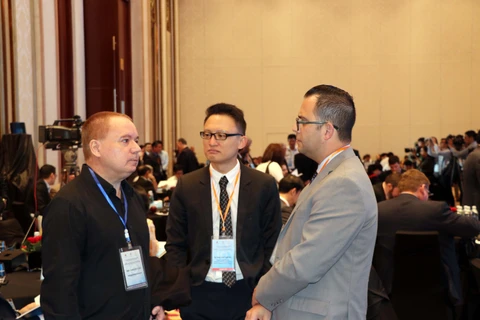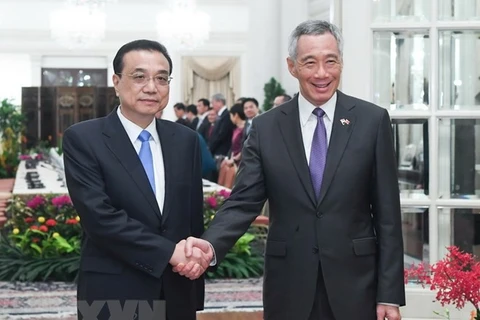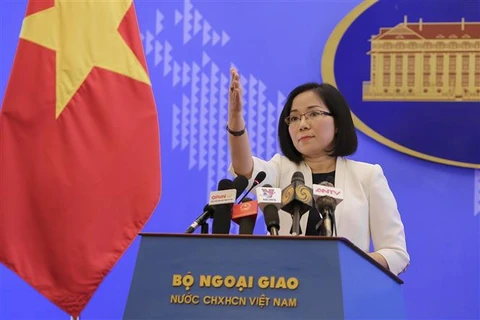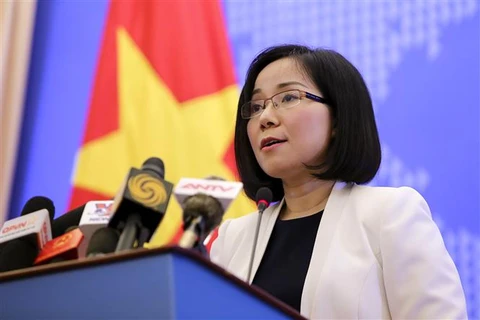Hanoi (VNA) – An international seminar promoting maritime security cooperation in the East Sea took place in Hanoi on December 4, attracting 120 scholars and experts from within and outside the region, and representatives from about 30 diplomatic corps in Vietnam.
With the participation of foreign speakers from the United Nations International Law Commission, the UK, Australia, France, Japan, Malaysia, the Philippines, and Vietnam, the event heard nine presentations and 20 opinions on regional and international experience in maritime demarcation and the settlement of disputes at sea, as well as legal aspects of the collaboration among law enforcement forces at sea.
Addressing the event, Deputy Director of the Diplomatic Academy of Vietnam Pham Lan Dung said the recent developments in the East Sea have forced coastal countries to deploy law enforcement forces at sea, thus leading to unexpected encounters. As such, the time has come for a frank discussion to enhance their cooperation to mitigate unexpected encounters, she added.
Australian Ambassador to Vietnam Craig Chittick said Australia shares the same viewpoint with ASEAN and other countries on the joint vision for the region and operation principles of international system, including the peaceful settlement of disputes in line with international law, refraining from the use of or threat to use forces, respect for navigation and aviation freedom, and protection of the rights and interests of smaller countries.
UK Vice Ambassador to Vietnam Steph Lysaght said the seminar provides an invaluable opportunity to strengthen understanding about maritime security and the role of maritime freedom in global trade.
Speakers highlighted the peaceful means used to settle international disputes, including the compulsory mediation measure for maritime demarcation between Australia and East Timor in the Timor Sea and Malaysia’s successful settlement of territorial disputes with Indonesia and Singapore by bringing the case to the International Court of Justice.
Based on previous lessons, speakers offered suggestions regarding maritime demarcation and cooperation promotion in the East Sea, especially in terms of fisheries.
Several opinions suggested expanding the Code for Unplanned Encounters at Sea to cover law enforcement forces, holding international law courses for ASEAN law enforcement forces, and enhancing trilateral and multilateral cooperation frameworks. –VNA
With the participation of foreign speakers from the United Nations International Law Commission, the UK, Australia, France, Japan, Malaysia, the Philippines, and Vietnam, the event heard nine presentations and 20 opinions on regional and international experience in maritime demarcation and the settlement of disputes at sea, as well as legal aspects of the collaboration among law enforcement forces at sea.
Addressing the event, Deputy Director of the Diplomatic Academy of Vietnam Pham Lan Dung said the recent developments in the East Sea have forced coastal countries to deploy law enforcement forces at sea, thus leading to unexpected encounters. As such, the time has come for a frank discussion to enhance their cooperation to mitigate unexpected encounters, she added.
Australian Ambassador to Vietnam Craig Chittick said Australia shares the same viewpoint with ASEAN and other countries on the joint vision for the region and operation principles of international system, including the peaceful settlement of disputes in line with international law, refraining from the use of or threat to use forces, respect for navigation and aviation freedom, and protection of the rights and interests of smaller countries.
UK Vice Ambassador to Vietnam Steph Lysaght said the seminar provides an invaluable opportunity to strengthen understanding about maritime security and the role of maritime freedom in global trade.
Speakers highlighted the peaceful means used to settle international disputes, including the compulsory mediation measure for maritime demarcation between Australia and East Timor in the Timor Sea and Malaysia’s successful settlement of territorial disputes with Indonesia and Singapore by bringing the case to the International Court of Justice.
Based on previous lessons, speakers offered suggestions regarding maritime demarcation and cooperation promotion in the East Sea, especially in terms of fisheries.
Several opinions suggested expanding the Code for Unplanned Encounters at Sea to cover law enforcement forces, holding international law courses for ASEAN law enforcement forces, and enhancing trilateral and multilateral cooperation frameworks. –VNA
VNA
























